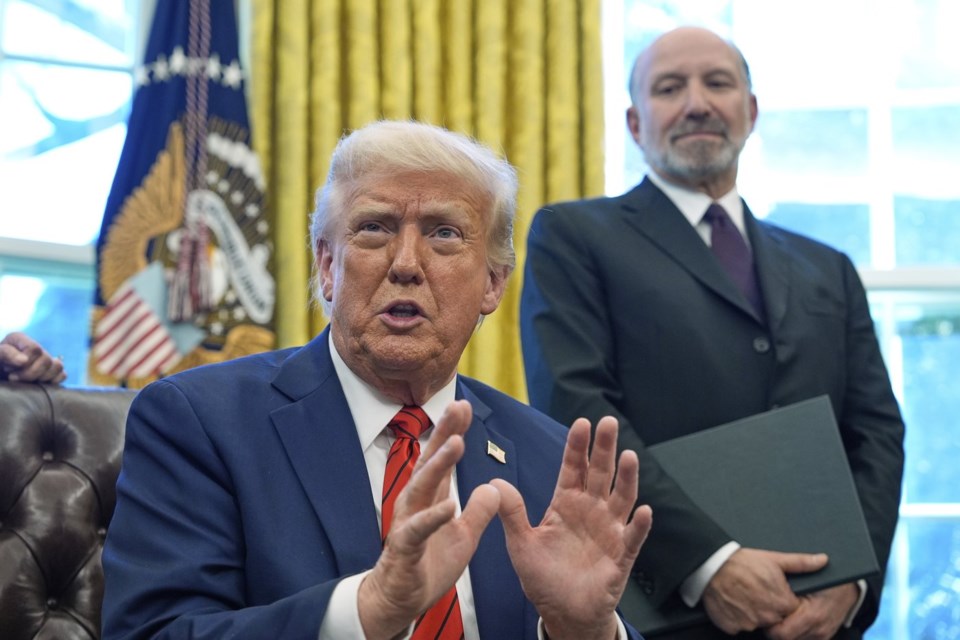WASHINGTON (AP) вҖ” When the stock market was climbing in January 2024, Donald Trump knew exactly who deserved credit: He did.
Nearly a year before his return to the White House, he declared that investors were celebrating his lead in the polls against President Joe Biden.
When the stock market fell Wednesday on news that the American economy had during the first three months of 2025, Trump knew exactly who to blame: Biden.
вҖңThis is ,вҖҷвҖҷ he posted, adding that Biden вҖңleft us with bad numbers, but when the boom begins, it will be like no other. BE PATIENT!!!вҖҷвҖҷ
Trump also said, вҖңOur Country will boom, but we have to get rid of the Biden 'Overhang.' This will take a while, has NOTHING TO DO WITH TARIFFS.вҖқ
Yet for economists puzzling out how prices and hiring will change in the coming months, or businesses struggling with a starkly uncertain future, Trump's massive and unpredictable import taxes on almost every country do in fact bear much of the blame. Rarely have a new president's policies had such a sharp, immediate impact on the economy.
To Georgia Tech UniversityвҖҷs Mark Zachary Taylor, who studies the economic policies of the American presidents, TrumpвҖҷs assertions sound like a brazen double standard. вҖңHe cannot have it both ways,вҖҷвҖҷ Taylor said by email, вҖңthough he always tries.вҖҷвҖҷ
TrumpвҖҷs attempt to shift blame for bad economic news to his predecessor raises a question: At what point in a four-year term does a new president assume responsibility for the economyвҖҷs performance?
Commerce Secretary Howard Lutnick has said in interviews that the benefits of TrumpвҖҷs policies will be felt in the second half of this year, particularly in the fourth quarter.
And Taylor notes that for a typical president, вҖңit might take six months to two years for us to accurately call the economy вҖҳtheirs.вҖҷвҖқ
But the threshold is different for presidents who enter the White House with big ambitions to reshape the economy from the get-go.
вҖңThe more boldly an incoming president acts (and the stronger his Congressional support), the sooner the economy becomes вҖҳhis,вҖҷ вҖқ Taylor said.
The most notable example is President Franklin D. Roosevelt, who pushed through major legislation вҖ” including a bill that effectively established deposit insurance to calm a banking crisis вҖ“ to combat the Great Depression during his first 100 days in office. Presidents Ronald Reagan and Barack Obama also entered office during economic crises and moved swiftly to deal with them.
But even they did not move the economic data as quickly or sharply as Trump. On Wednesday, the government reported that imports surged 41%, the biggest jump вҖ” excluding the pandemic вҖ” since 1972. Companies rushed to bring in goods in the first quarter to beat the impending tariffs.
The flood of imports pulled down growth, under the government's accounting, and the economy , the first decline in two years. The negative showing is what prompted Trump's Biden-bashing post on Wednesday.
The figures are "exactly what one would expect from millions of American businesses and households trying to get ahead of looming tariff hikes,вҖҷвҖҷ Taylor said, adding that TrumpвҖҷs trade war is also responsible for the slumping stock market and a drop in the value of the dollar.
Surveys show that manufacturers are receiving fewer orders and that their production is falling. On Thursday, the Institute for Supply Management, a trade group of purchasing managers, released its , which typically includes a selection of comments from its membership.
Typically, the comments reflect the individual concerns of a specific industry, whether chemicals, electronics, or clothing makers. In April's report, all 10 comments вҖ” every single one вҖ” focused on tariffs.
вҖңTariffs impacting operations вҖ” specifically, delayed border crossings and duties calculations that are complex and not completely understood,вҖқ one company in the transportation equipment sector said. вҖңAs a result, we are potentially overpaying duties.вҖқ
Trump has blown up the existing world trade system by slapping 10% import taxes вҖ“ tariffs вҖ“ on friends and foes alike in the name of bringing back jobs to the U.S. HeвҖҷs plastered 145% tariffs on China, drawing retaliation from Beijing that threatens to end trade between the worldвҖҷs two largest economies. HeвҖҷs also hit foreign steel, aluminum and autos.
The erratic way heвҖҷs rolled out his protectionist policies вҖ“ introducing, then suspending tariffs, then announcing new ones вҖ“ has left companies, consumers and investors bewildered. The S&P 500 stock index has dropped 7% since just before Inauguration Day Jan. 20. And .
вҖңSome of what you are seeing right now is purely Trump related,вҖҷвҖҷ said Columbia UniversityвҖҷs Joseph Stiglitz, a Nobel Prize-winning economist and chair of the White House Council of Economic Advisers in the Clinton administration. вҖңNo one can look at what is going on in the economy without saying the on-again, off-again tariffs are not having an impact.
Paul Wiseman And Christopher Rugaber, The Associated Press


